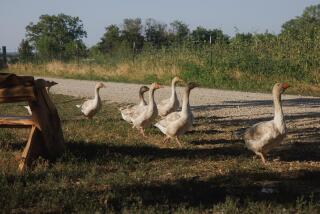WES JACKSON : ‘Discover,’ Don’t ‘Colonize’
- Share via
Relevance was the big thing back then. If an instructor wanted to get information through the politicized skulls of ‘60s students, he had darn well better demonstrate the subject’s relevance.
With that in mind, Wes Jackson plunged into the library at Cal State Sacramento, where he had begun to teach a biology class.
Trained in cytogenetics with an emphasis on chromosomal evolution, Jackson had already rolled up his sleeves for a career as a professional intellectual.
But as he “zipped and clipped and filed” his way through newspapers and magazines, he began to see that the monumental problems of overpopulation, resource depletion and environmental degradation were problems of biology.
Relevance knocked him right off the academic fast track.
For almost 10 years, Jackson continued to teach. But he also longed to sink some roots, to get down in the dirt and plant his theories: “I wanted to use both my head and my hands.”
In 1976, Jackson resigned his tenured professorship. With $5,000 in savings, his family moved to Salina, Kan., where he and his wife, Dana, created the Land Institute, an unusual teaching and research farm that has become, in the eyes of many, a source of hope for saving America from future desertification and famine.
Jackson’s visionary--a few would say crackpot--thinking sprouted when he noticed that the plowed wheat fields and corn fields of the world’s breadbasket were losing their soil at a frightening rate. He also saw that the surrounding native prairie wasn’t.
From that comparison evolved the idea that he and a growing cadre of believers hope will someday revolutionize farming.
At its simplest, his theory suggests that farmers should approach food production the way nature does. A single crop, planted in a plowed field, immediately becomes susceptible to disease and addicted to increasing doses of pesticides, herbicides and fertilizers. It also dies each year and must be plowed under with energy-consuming machinery, exposing the soil to wind and erosion.
On the other hand, perennials that flourish on prairies produce lasting root systems that hold the soil in place. They also produce protein-rich foodstuff.
So Jackson proposes that farmers maintain a more natural assortment of self-replenishing grains and legumes on unplowed plots.
There are stumbling blocks to this plan. One small matter is that for Jackson’s scheme to work, Americans will have to completely rethink their place in nature and change the way they live.
In a nutshell, Americans need to slow down--to stop driving themselves and their cars. They need to adopt an economy that is self-replenishing. Like nature.
NOTABLE
Author of several books, including “Man and the Environment,” “Altars of Unhewn Stone,” “New Roots for Agriculture” and “Meeting the Expectations of the Land,” with Wendall Berry and Bruce Colman.
NAME: WES JACKSON
TITLES: Ph.D. in genetics. Founder, Land Institute in Salina, Kan.
QUOTE: “I would like for all of us to become better accountants, to quit treating the Earth as a mine, and instead look to it as a source of hope. We’ve got to figure out ways to stay amused while we live, till we die cheap--that means inexpensively to the life support system.”






